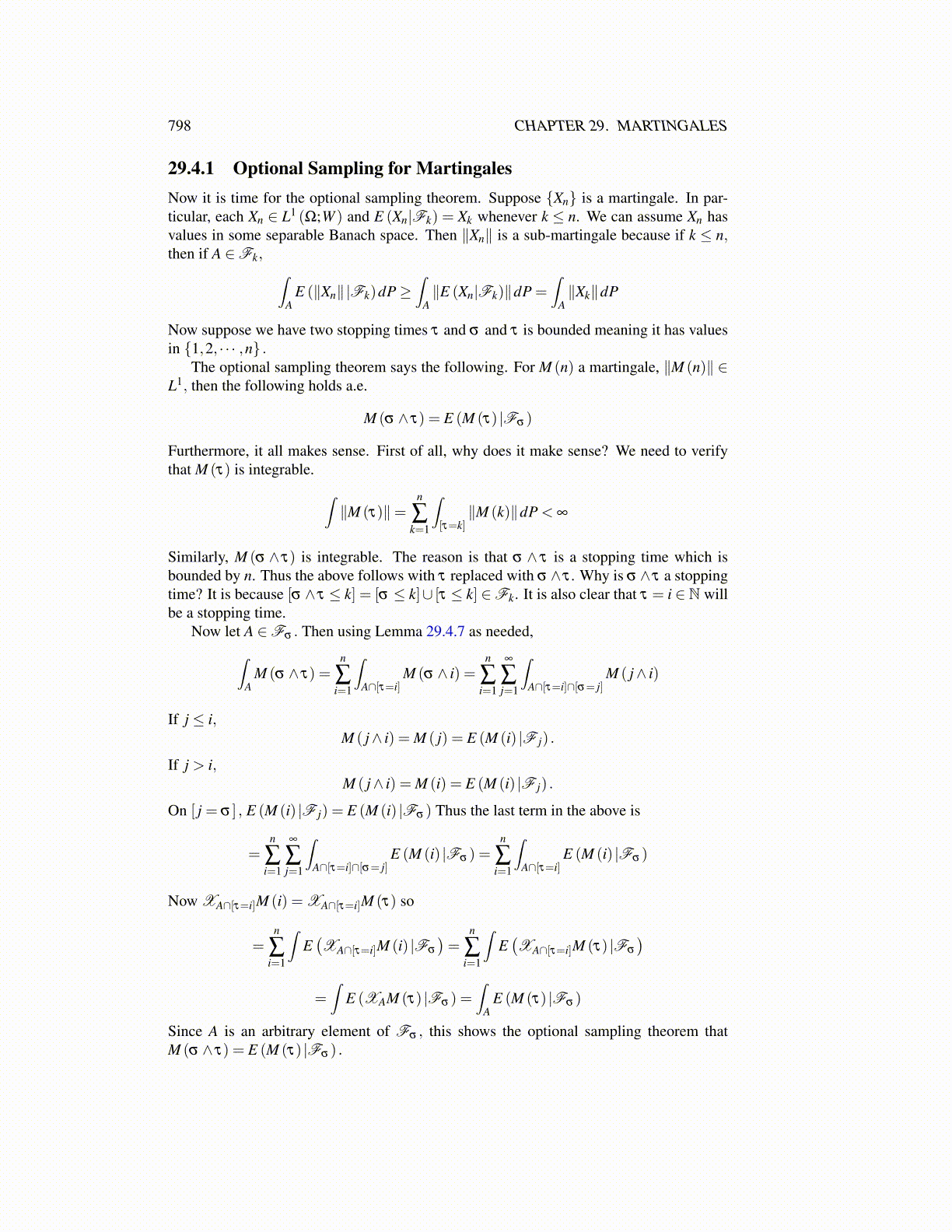
798 CHAPTER 29. MARTINGALES
29.4.1 Optional Sampling for MartingalesNow it is time for the optional sampling theorem. Suppose {Xn} is a martingale. In par-ticular, each Xn ∈ L1 (Ω;W ) and E (Xn|Fk) = Xk whenever k ≤ n. We can assume Xn hasvalues in some separable Banach space. Then ∥Xn∥ is a sub-martingale because if k ≤ n,then if A ∈Fk, ∫
AE (∥Xn∥|Fk)dP≥
∫A∥E (Xn|Fk)∥dP =
∫A∥Xk∥dP
Now suppose we have two stopping times τ and σ and τ is bounded meaning it has valuesin {1,2, · · · ,n} .
The optional sampling theorem says the following. For M (n) a martingale, ∥M (n)∥ ∈L1, then the following holds a.e.
M (σ ∧ τ) = E (M (τ) |Fσ )
Furthermore, it all makes sense. First of all, why does it make sense? We need to verifythat M (τ) is integrable. ∫
∥M (τ)∥=n
∑k=1
∫[τ=k]∥M (k)∥dP < ∞
Similarly, M (σ ∧ τ) is integrable. The reason is that σ ∧ τ is a stopping time which isbounded by n. Thus the above follows with τ replaced with σ ∧τ . Why is σ ∧τ a stoppingtime? It is because [σ ∧ τ ≤ k] = [σ ≤ k]∪ [τ ≤ k] ∈Fk. It is also clear that τ = i ∈ N willbe a stopping time.
Now let A ∈Fσ . Then using Lemma 29.4.7 as needed,∫A
M (σ ∧ τ) =n
∑i=1
∫A∩[τ=i]
M (σ ∧ i) =n
∑i=1
∞
∑j=1
∫A∩[τ=i]∩[σ= j]
M ( j∧ i)
If j ≤ i,M ( j∧ i) = M ( j) = E (M (i) |F j) .
If j > i,M ( j∧ i) = M (i) = E (M (i) |F j) .
On [ j = σ ] , E (M (i) |F j) = E (M (i) |Fσ ) Thus the last term in the above is
=n
∑i=1
∞
∑j=1
∫A∩[τ=i]∩[σ= j]
E (M (i) |Fσ ) =n
∑i=1
∫A∩[τ=i]
E (M (i) |Fσ )
Now XA∩[τ=i]M (i) = XA∩[τ=i]M (τ) so
=n
∑i=1
∫E(XA∩[τ=i]M (i) |Fσ
)=
n
∑i=1
∫E(XA∩[τ=i]M (τ) |Fσ
)=∫
E (XAM (τ) |Fσ ) =∫
AE (M (τ) |Fσ )
Since A is an arbitrary element of Fσ , this shows the optional sampling theorem thatM (σ ∧ τ) = E (M (τ) |Fσ ) .